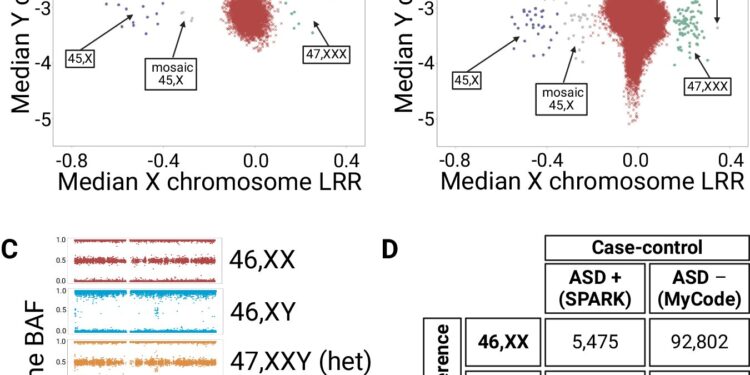Identification of sex chromosome aneuploidy in the SPARKMC-SCA cohort. Credit: Natural communications (2024). DOI: 10.1038/s41467-024-53211-7
Increased risk of autism appears to be linked to the Y chromosome, according to a Geisinger Health System study, offering a new explanation for the greater prevalence of autism in men. The results are published in Natural communications.
Autism spectrum disorder (ASD) is a neurodevelopmental condition characterized by impaired social interaction and communication, as well as restricted and repetitive patterns of behavior, interests, and activities. ASD is nearly four times more common among men than women, but the reason for this disparity is not well understood.
A common hypothesis involves the difference in sex chromosomes between men and women: typical women have two X chromosomes, while typical men have one X and one Y chromosome.
“A leading theory in this area is that protective factors on the X chromosome decrease the risk of autism in women,” said Matthew Oetjens, Ph.D., assistant professor at the Institute of Autism Medicine and the development of Geisinger.
The Geisinger research team, led by Dr. Oetjens and scientist Alexander Berry, Ph.D., sought to determine the effects of the X and Y chromosomes on autism risk by examining ASD diagnoses in people having an abnormal number of X or Y chromosomes, a genetic disorder known as sex chromosome aneuploidy.
The team analyzed genetic and ASD diagnostic data on 177,416 patients enrolled in the Simons Foundation’s Powering Autism Research (SPARK) study and Geisinger’s MyCode community health initiative. They found that individuals with an extra X chromosome showed no change in their ASD risk, but those with an extra Y chromosome were twice as likely to have an ASD diagnosis. This suggests a risk factor associated with the Y chromosome instead of a protective factor associated with the X chromosome.
“Although these may seem like two sides of the same coin, our results encourage us to look for risk factors for autism on the Y chromosome instead of limiting our search to protective factors on the said Dr. Berry. “However, further research is needed to identify the specific risk factor associated with the Y chromosome.”
This analysis also confirms previous work by showing that loss of an X or Y chromosome, known as Turner syndrome, is associated with a sharp increase in ASD risk. Further research is needed to determine whether ASD risk factors associated with sex chromosome aneuploidy explain the sex difference in ASD prevalence.
More information:
Alexander SF Berry et al, Genome-first study of sex chromosome aneuploidies provides evidence for effects of Y chromosome dosage on autism risk, Natural communications (2024). DOI: 10.1038/s41467-024-53211-7
Provided by Geisinger Health System
Quote: Increased risk of autism linked to the Y chromosome, according to a study (October 17, 2024) retrieved October 17, 2024 from
This document is subject to copyright. Except for fair use for private study or research purposes, no part may be reproduced without written permission. The content is provided for informational purposes only.



